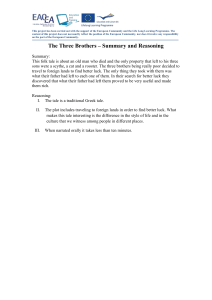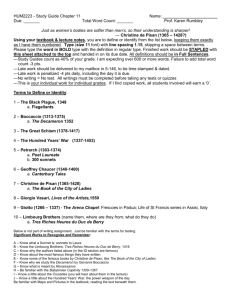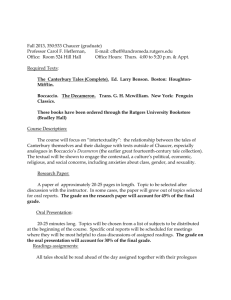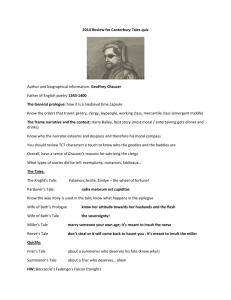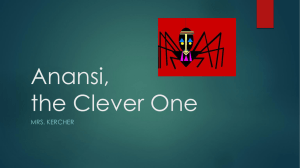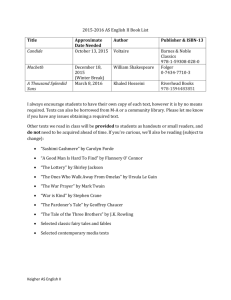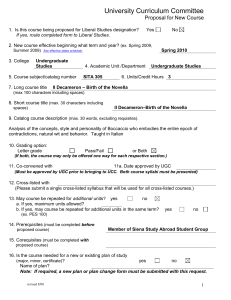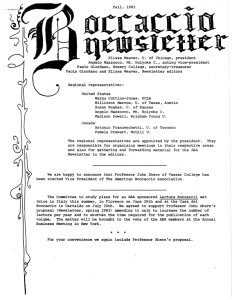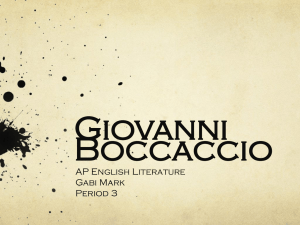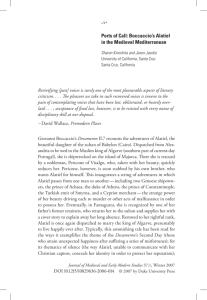lectura boccaccii - The American Boccaccio Association
advertisement
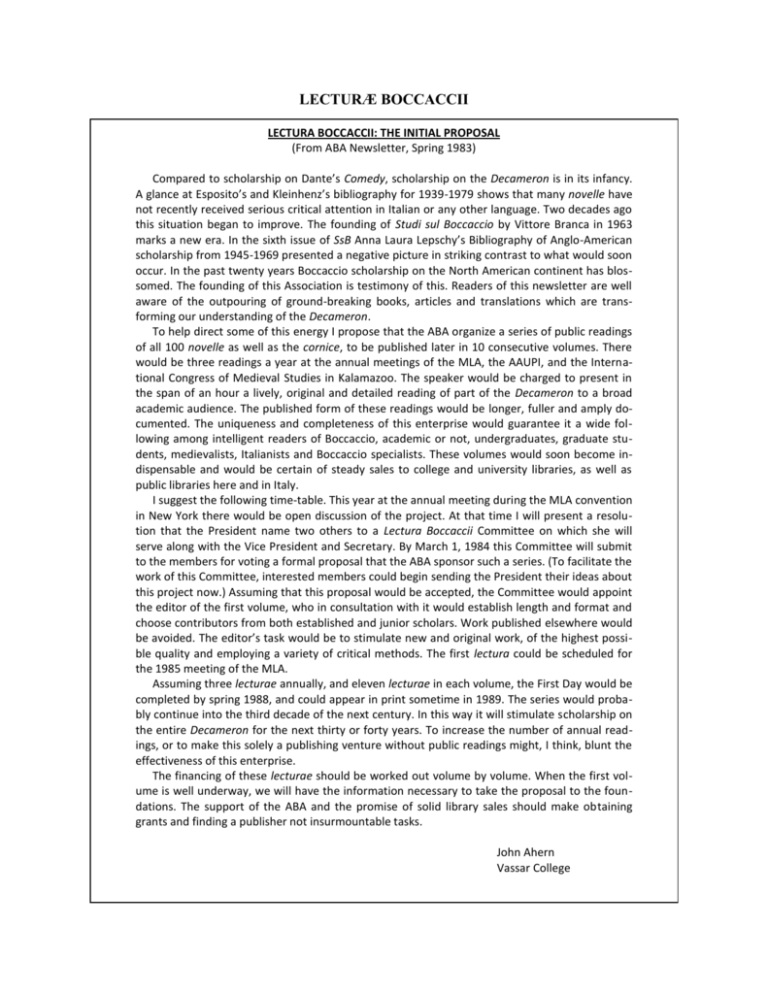
LECTURÆ BOCCACCII LECTURA BOCCACCII: THE INITIAL PROPOSAL (From ABA Newsletter, Spring 1983) Compared to scholarship on Dante’s Comedy, scholarship on the Decameron is in its infancy. A glance at Esposito’s and Kleinhenz’s bibliography for 1939-1979 shows that many novelle have not recently received serious critical attention in Italian or any other language. Two decades ago this situation began to improve. The founding of Studi sul Boccaccio by Vittore Branca in 1963 marks a new era. In the sixth issue of SsB Anna Laura Lepschy’s Bibliography of Anglo-American scholarship from 1945-1969 presented a negative picture in striking contrast to what would soon occur. In the past twenty years Boccaccio scholarship on the North American continent has blossomed. The founding of this Association is testimony of this. Readers of this newsletter are well aware of the outpouring of ground-breaking books, articles and translations which are transforming our understanding of the Decameron. To help direct some of this energy I propose that the ABA organize a series of public readings of all 100 novelle as well as the cornice, to be published later in 10 consecutive volumes. There would be three readings a year at the annual meetings of the MLA, the AAUPI, and the International Congress of Medieval Studies in Kalamazoo. The speaker would be charged to present in the span of an hour a lively, original and detailed reading of part of the Decameron to a broad academic audience. The published form of these readings would be longer, fuller and amply documented. The uniqueness and completeness of this enterprise would guarantee it a wide following among intelligent readers of Boccaccio, academic or not, undergraduates, graduate students, medievalists, Italianists and Boccaccio specialists. These volumes would soon become indispensable and would be certain of steady sales to college and university libraries, as well as public libraries here and in Italy. I suggest the following time-table. This year at the annual meeting during the MLA convention in New York there would be open discussion of the project. At that time I will present a resolution that the President name two others to a Lectura Boccaccii Committee on which she will serve along with the Vice President and Secretary. By March 1, 1984 this Committee will submit to the members for voting a formal proposal that the ABA sponsor such a series. (To facilitate the work of this Committee, interested members could begin sending the President their ideas about this project now.) Assuming that this proposal would be accepted, the Committee would appoint the editor of the first volume, who in consultation with it would establish length and format and choose contributors from both established and junior scholars. Work published elsewhere would be avoided. The editor’s task would be to stimulate new and original work, of the highest possible quality and employing a variety of critical methods. The first lectura could be scheduled for the 1985 meeting of the MLA. Assuming three lecturae annually, and eleven lecturae in each volume, the First Day would be completed by spring 1988, and could appear in print sometime in 1989. The series would probably continue into the third decade of the next century. In this way it will stimulate scholarship on the entire Decameron for the next thirty or forty years. To increase the number of annual readings, or to make this solely a publishing venture without public readings might, I think, blunt the effectiveness of this enterprise. The financing of these lecturae should be worked out volume by volume. When the first volume is well underway, we will have the information necessary to take the proposal to the foundations. The support of the ABA and the promise of solid library sales should make obtaining grants and finding a publisher not insurmountable tasks. John Ahern Vassar College Work Plan: Volume I The Decameron. First Day in Perspective. Elissa Weaver, ed. Toronto: University of Toronto Press, 2003. Introduction. The Decameron Proem. The Place of the Title (Decameron, Day One, Introduction.) I.1 The Tale of Ser Ciappelletto. I.2 The Tale of Abraham the Jew. I.3 The Tale of the Three Rings. I.4 The Tale of the Monk and His Abbott. I.5 The Tale of the Marchioness of Monferrato. I.6 The Tale of the Inquisitor. I.7 The Tale of Bergamino. I.8 The Tale of Guiglielmo Borsiere. I.9 The Tale of the King of Cyprus and the Lady of Gascony. I.10 The Tale of Maestro Alberto. Elissa Weaver Robert Hollander Thomas Stillinger Franco Fido Marga Cottino-Jones Pamela Stewart Ronald Martinez Dante della Terza Janet Smarr Michelangelo Picone Victoria Kirkham Pier Massimo Forni Millicent Marcus Volume II The Decameron. Second Day in Perspective. Victoria Kirkham, ed. Toronto: University of Toronto Press. In submission process. Introduction. Victoria Kirkham II.1 Kevin Brownlee II.2 Rebecca West II.3 David Wallace II.4 H. Wayne Storey II.5 Christopher Kleinhenz II.6 Michael Sherberg II.7 Joan Ferrante II.8 Susan Noakes II.9 Elissa Weaver II.10 Teodolinda Barolini Volume III The Decameron. Third Day in Perspective. Pier Massimo Forni and Francesco Ciabattoni, eds. Toronto: University of Toronto Press. In review process. Introduction. III.1 Literature and Pornography: The Novella of Masetto da Lamporecchio III.2 The Tale of King Agilulf and his Groom III.3 Wool Combs and a Woman’s Scorn: Economy of Desire III.4 Secrets and Lies: Utilitas, Civanza, and Recreantise in Boccaccio’s Allegory of Good and Bad Government III.5 Zima and the Hermeneutics of Silence III.6 III.7 The Clash of Moral Codes in the Novella of Tedaldo of the Elisei III.8 Boccaccio’s Parodic Poetics of Purgatory: On Dante and the Truth of Fiction III.9 Wandering Wombs, Physicke & Bed-Tricks III.10 Volume IV The Decameron. Fourth Day in Perspective. Michael Sherberg, ed. In progress. Introduction. Timothy Kircher IV.1 Tobias Gittes IV.2 IV.3 Michael Papio IV.4 IV.5 Kristina Olson IV.6 Regina Psaki IV.7 Suzanne Magnanini IV.8 Annelise Brody IV.9 Eugenio Giusti IV.10 Fabian Alfie Pier Massimo Forni and Francesco Ciabattoni Massimo Ciavolella Elsa Filosa Stefano Gulizia Roberta Morosini Alessandro Vettori Myriam Swennen Ruthenberg Susanna Barsella Martin Eisner Anthony Cassell Steven Grossvogel
